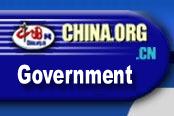China is to develop a legal framework to clear the way for breaking up monopolies in the infrastructure sector and in supplying public utilities.
"The government will stick to laws and regulations to carry out the reforms,'' Wang Qishan, director of the State Economic Restructuring Office, said yesterday in Beijing at the China Development Forum.
The government will improve laws relating to electric power, aviation and the railways, and bring in laws on telecommunications, oil and natural gas, he said.
These will help break up monopolies and enhance competition, Wang said.
"Reform and restructuring of monopolies should not just be a government order, it should stem from good practice,'' Wang said.
Ross Garnaut, professor of the Australian National University, a famous economist specializing in the Asia-Pacific region, said China is a large country and the government is unable to manage everything related to the break up of monopolies.
"The only way is to set up a comprehensive set of laws and, more importantly, to enforce those laws,'' he said.
Restructuring monopolies is one of the most important parts of the country's 10th Five-Year Plan (2001-05).
The Chinese government is determined to break monopolies in all sectors except those related to the state security, natural resources and a small number of public services.
Electric power, railways, aviation and telecommunications will be the focal point of the first phase of reforms, Wang said.
He said reforms in such monopolized industries lags far behind reforms in other fields.
It hampers the development of China's infrastructure construction and utility supply, as well as blocking the establishment of a comprehensive socialist market economy, Wang said.
The core of the reforms lie in separating the government's management role from enterprise operation, giving full play to market forces.
According to Wang, the reforms will focus on introducing more competitors, allowing non-state investment, including foreign capital, to enter the infrastructure construction and utility supply sectors. They will also allow the restructuring of companies' financial systems and the establishment of modern management techniques.
Meanwhile, Wang said, the government will also set up a fair, transparent, unified and efficient supervision system.
Garnaut suggested that China speed up the opening of its monopoly industries to domestic investors before it opens them to overseas investors when China enters the World Trade Organization.
He also pointed out that China needs to break up regional barriers as well as national monopolies.
(China Daily 03/27/2001)
